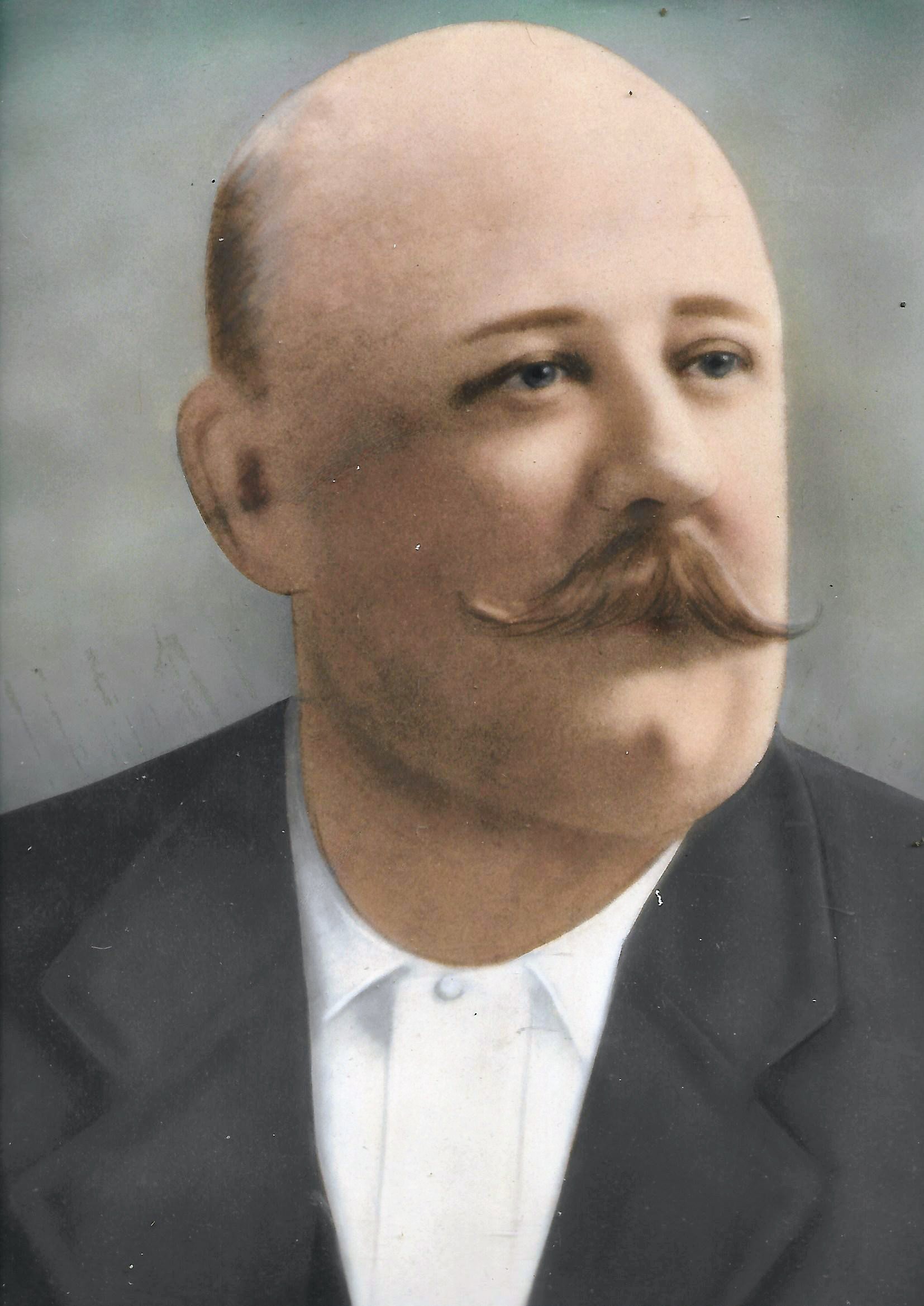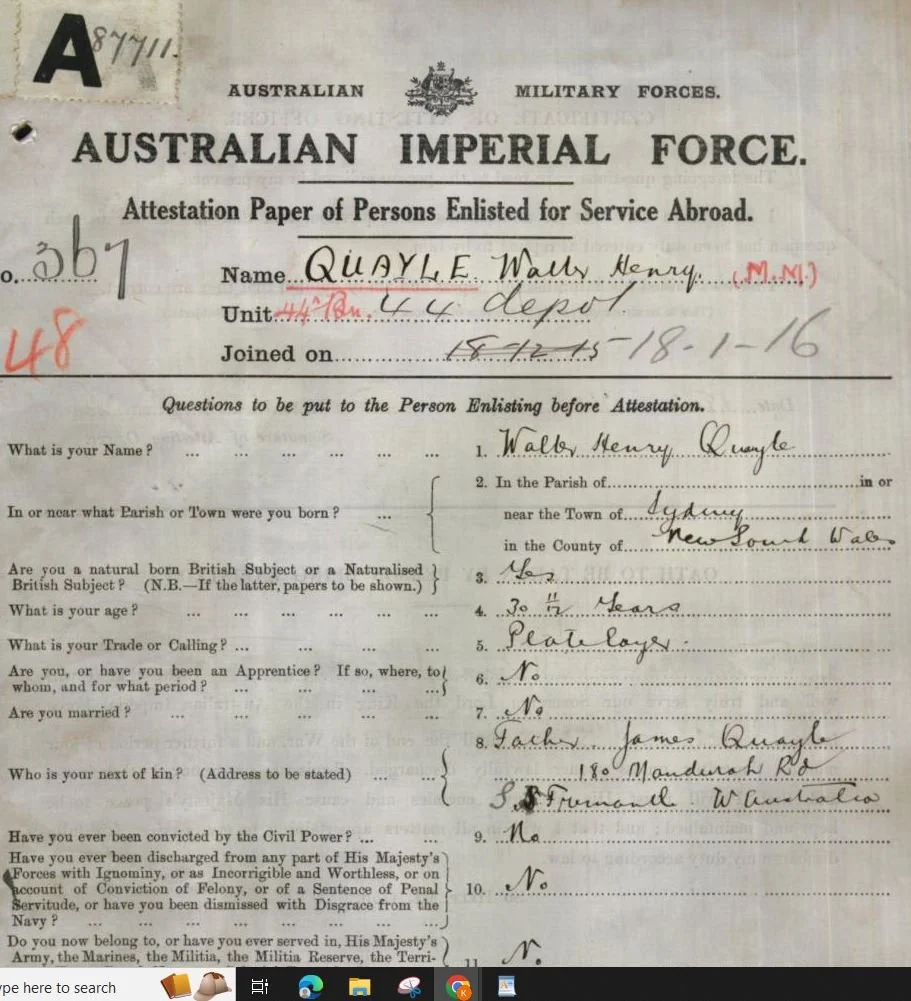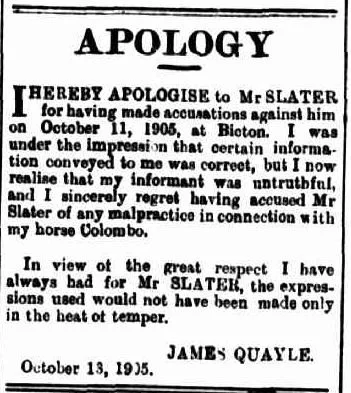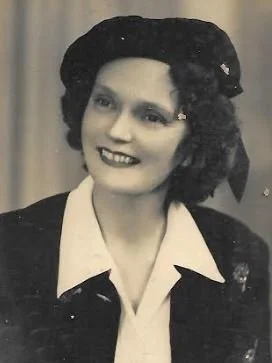James 'Jim' Quayle
(1861-1920)
James Quayle was a colourful character with a rich life. He worked as a teamster and carrier, managing teams of horses and using them to cart material to make roads in Fremantle. Originally from Victoria, where he undertook some of the first sewerage work in Melbourne, James came to Fremantle in 1896. In June 1900, he won a contract to build Sydney and Wardie Streets in South Fremantle. (reference) He also contracted work at the Port, the Fremantle Oval, Fremantle Markets, and "converted High-street from a heap of debris into the present-day boulevard". (reference)
His children were also respected and resilient- especially his eldest son Wally Quale, a 'South Fremantle boy', who had a courageous and generous spirit. Although losing one eye from his military service during WW l, on his return Wally played a big part in fundraising for the Returned Soldiers and Fremantle Hospital.
James 'Jim' Heath Quayle (1861-1920) was born at Goulbourn Valley, in Victoria, It was said at his funeral that as a child he "showed a dislike for discipline as administered by the schoolmaster, and displayed a natural proclivity for the saddle... He was christened in the same hall and on the same day as Dan Kelly, and probably knew more about the Kelly Gang than any man in Australia. Migrating to New South Wales and Queensland, he became famous as a teamster, and was known from the Gulf to Wyndham (WA) as 'The Overlander'. (reference)
James was to become bankrupt twice in his life- the first time was in 1884:
James Quayle, of Australian Eleven Hotel, Bay-street, Port Melbourne, carrier. Causes of insolvency— Inability to obtain remunerative employment and losses in business (reference) .
Despite being bankrupt- in 1885 James Quayle married Margaret Jeremy (1864-1952) in Brewarrina, NSW. Margaret was born in Newcastle in 1864 to Peter and Elizabeth Jeremy. James and Margaret had five children: Walter 'Wally' or 'Wal' Henry (1884-1941), Florence 'Florrie' Elsie May (1885-1952), James W. 'Jim' (1887 and went to Queensland?) Christoper George Edward (1901-1938) and Lily Alice Mary (1906-1984).
In 1892 at the Yarra Glen Police Court, James Quayle, was prosecuted for not sending his children to school for the required number of days in the quarter. A fine of 2s. 6d. was inflicted. (reference)
In 1897 James and Margaret brought their family to WA. Wally, the eldest child, was 12 years old. The family first lived in Scott Street, Fremantle before moving to 180 Mandurah Road, Beaconsfield/South Fremantle, where they stayed from 1903 until the 1920s. Mandurah Road, (which originally followed an ancient Aboriginal track) was the main entrance to Fremantle from the south and was only changed to South Terrace in 1951/52. (Heritage Council)
“The family story is James was the last person to see C.Y.O’Conner before he shot himself but I can't find any proof of that. I know he rode his horse with his daughter every day that route, and 180 Mandurah road was the last house before South Beach so it seams very likely it was true and perhaps they knew each other due to the council contracts James had." John Meier
In June 1900 James was successful in his tender to build Sydney and Wardie Sts (renamed Sheedy St in 1982) in Fremantle. (reference)
Oct 1900 "LOST, Bay Mare, heavy in foal, white blaze on face, both hind feet white, branded UJE off shoulder, 199 off buttock. Reward. James Quayle, Scott-street, Fremantle." (reference)
Fremantle was a rough place at this time. In June 1903 James was witness to a stabbing on Mandurah Road when a Finnish man attacked a 'Mahomedan' (Afghan/Indian?) man. (reference)
The family had a long connection to horses and horseracing- and James was one of the founders of the Fremantle Racing Club, and the Bicton Races. In 1904 James was the owner of 'Colombo' a horse that ran in the July Cup at the Bicton Races. (reference) and ‘Gala’ who ran in the Coogee races (reference). In 1905 he made a public apology to a Mr Slater in connection to 'Colombo' and admitted to having a 'temper'. (reference) That year one of his horses went missing and he offered a reward for its return in the paper. (reference) In 1907 James Quayle had a harness stolen (reference) and was charged with having unlawfully assaulted George Wright at Fremantle on January 31 - the dispute seemed to be over money and horses. (reference)
In 1908 James had been a contractor for 10 years, mostly working as a carter in Fremantle, when he found himself again in the Bankruptcy Court. He pleaded that his wife had been sick and he had five children to support. He had been carting for the Fremantle Smelter since 1901, and had kept ten of his hired horses for long after he had employment for them, in anticipation the smelters would reopen. When they didn’t and many of his horses were damaged, and some died, through eating spear grass in chaff, James found himself in trouble and before the Fremantle Courts, where he lost his case. (reference) James denied he had a gambling problem but also admitted he was a shareholder in the Bicton Racecourse. (reference)
In July 1909 Walters sister Florence married John Wardell Simmons (1880-1963). They had 3 children: George James, Mavis and Dulcie.
In 1913 'Jim' Quayle (late of the Fremantle Smelting Works) left for Broome by the s.s. Gorgon to work for the Broome Council as a road-maker. (reference)
When "Jim" Quayle died on 7 January 1920, at Fremantle Hospital, aged 59, the Fremantle Herald described him as South Fremantle's best known citizen. (reference) (reference)
The Late James Quayle (by 'one who knew him’) was the best known figure at the Fremantle Smelters during their hey-dey, his stentorian voice being talked about today... The genial Jim was no man's enemy, and every man, woman and child was his friend. The world is the poorer for his going. He passed the 59th mile stone on New Year's Day and looked good for a hundred, but a long-borne internal complaint proved too much. E.I.P. Fremantle Herald 9 January 1920, page 7 (reference)
The family was devastated, and posted memorial notices every year until 1937.
In fondest memory of James Quayle, who passed away at Fremantle on January 7, 1920: A token of love and remembrance, to the one we can never forget. Inserted by his loving wife and family, Walter, Flo, Chris, Lily, and son-in-law (J. Simmons). (reference)
James's eldest son Walter was 5 ft 9 inches, and a very good sportsman, who played cricket, and football for South Fremantle Football Club. Wally was also a passionate member of the Australian Labour Federation (ALF).
In 1911 Labor won a landslide electoral victory in the State elections with John Scaddan, previously General Secretary of the ALF, becoming the second Labor Premier of Western Australia. In 1914, both Fremantle's Alex McCallum, a director of the Westralian Worker, and ALF President Doland were strongly against the war, but they were in the minority. Most of those in WA Labor supported Prime Minister Hughes and the war effort. In late October 1916, the Australian people voted by a narrow majority against the introduction of conscription but in WA the vote was 70% in favour of conscription. In 1919, in a move which brought it into line with the Federal organisation and the other state bodies, the ALF changed its name to become the Australian Labor Party (WA Branch)
Wally was introduced to the ALF as a Union Rep from the Metropolitan Barmaids and Barmen's Union in May 1912. (reference) By 1914 he was vice-president of the South Fremantle ALF (reference) and president of the Metropolitan Barmaids and Barmen's Union. (reference)
1913 "One of the most hustlesome coves this scribe wots of is Wally Quayle, secretary of the South Fremantle branch A.L.F. Always up to his neck in work, he manages to cram more into one day than most mortals do into two. Many and varied are his accomplishments, and how he escaped becoming an insurance agent or a cheap jack is a puzzle to his friends. Intended for the Church, he early evinced a predilection for something more strenuous, and took up navying, with unsatisfactory results. Loves football, wields a hefty bat in the cricket field, dabbles in journalism, is something of a Thespian, a good judge of horses and er— women, and is withal a good sort. " Hawkseye, ALF notes, The Fremantle Herald, 26 Sept 1913, p 5 (reference)
In 1915, arising out of the Western Australia Day movement, and as WW l began- increased activity in the work of the Red Cross Society was undertaken in metropolitan and country districts and new Committees formed:
In South Fremantle a large enthusiastic meeting was held at Wesley Hall, on Mandurah-road in July. Mr. H. E. Bolton, M.L.A gave an outline of the objects of the Red Cross Society, and eighty six of those present joined the branch as members; and then proceeded to elect officers. Mr. W. Quale was elected Secretary. (reference)
Six months later, aged 30, Wally enlisted to fight:
Wally Quayle, an ardent barracker for Labor in South Fremantle and elsewhere, goes into camp on Monday to do his bit for the country. Tomorrow night the South Fremantle Red Cross will tender him a send off in Nelson Hall. Westralian Worker, 14 January 1916, p 5 (reference)
On 18 Jan 1916 Walter enlisted in the 44th Battalion, 11th Infantry Brigade, AIF. He gave his occupation as a plate-layer. After training, he embarked from Fremantle on the Southampton for Europe on the 6 June 1916 and within two months of being in France, he was promoted to Corporal in October 1916. Despite being wounded in Jan 1917, he remained on duty, and was again promoted to Acting Luietenant Sergeant in January 1917. He was wounded again, in action in France in June 1917 and later that month was awarded the Military Medal in England.
"Sgt W.H. Quayle was a member of a daylight party, raiding under H. Gaze, which met with great opposition by the enemy. By his brave and determioned action he encouraged his men who succeeded in killing and wouding a large number of the enemy. He returned with his party to our parapet, but when he found some of his party missing he promptly returned to NO MANS LAND and while searching for the missing men was himself wounded. Throughout the operation he displayed great bravery and set a splendid example to his men a total of 5 officers and 100 other ranks took part in this raid." (National Archives records)
He stayed in hospital, until August 1918- with wounds to his shoulder and became blind in one eye. Despite this he enrolled in a Rifle Course in early 1918 and returned to France to rejoin his Battalion (at Deverill, Sutton Very and Rouelles) in March 1918. He was promoted to Colonel Sergeant Major on 28 May 1918. He was wounded again for the third time in France in August 1918, with a severe leg wound and was invalided to the UK. He returned to Australia on the hospital ship Karoola on 13 Dec 1918.
On his return Wally became Secretary of the South Fremantle branch of the RSL and in October 1919 he was described by the Fremantle Herald as:
"Mr. Wally Quayle. One of the best hustlers for the Diggers' benefit in the West. Under the secretaryship of Wally, the South Fremantle Branch of the R.S.A. bids fair to becoming the most solid branch in the State." (reference)
In 1919 Wally wrote a letter to the paper:
As a returned soldier I desire, through your columns, to enter an emphatic protest against the accusation hurled by one of the women speakers at the "men on crutches," who, the speaker stated, hung around the hotels and betting shops, wearing the hungry and "doomed to perdition" look of the gambler. Now, Sir, my long association with the alleged "evil" as an owner of racehorses and trotters did not undermine my physique, nor warp my physiognomy sufficiently to have been turned down when I presented myself at Francis-street, nor did it prevent me gaining decorations and distinctions in the field equal to any won by any member of the anti-sport, killjoy organisations. SGT.-MAJOR W. H. QUAYLE. (reference)
In July 1920, Wally put his hand up for the South Fremantle Labour Party preselection ballots. ( reference) Unable to play sport himself due to his war injuries, Wal raised a lot of the money to build Fremantle Hospital, by organising charity cricket and football games between the 44th Battalion and South Fremantle Football Club.
In 1920 Wal was involved in a trip to New Norcia as part of a motor party, consisting of six cars and 30 persons... "Lieut. McCarthy made mention of the great good Mr. Parkin had done for the returned soldier as an honorary organiser of these trips. He also wished to include the car owners who were present; that night, without whom the trips would be impossible. When the war was on all were much concerned about the welfare of the soldier, but now the war was over there was a considerable falling-off of that concern; but the gentlemen he had mentioned had never for four and a half years relaxed in their efforts to put a little sunshine into the life of the man who had returned battle-scarred and war-worn." (reference)
On 7 June 1921, 41 yr old Walter married Hilda Frances Pyke (1881-1968) at St Paul's Church in Beaconsfield. She was the daughter of Charles Tyler Pyke of York. Forty year old Hilda had a daughter Madge (1904-1972). In 1925 they lived at 199 High St, Fremantle but from 1926 - 1941 Walter and Hilda lived at 'Walida', 20 Allen St, East Fremantle (this became 82 Allen St in 1939) and Hilda Quale lived there until 1947.
From 1923 Walter worked as a sports journalist with the Fremantle Advertiser (reference) .
1922: 44th Battalion. A. meeting was held at the Soldiers' Institute, Fremantle, on Tuesday, June 26, Chairman W. Quale presiding. It was decided to hold a social reunion at an early date and a strong mixed committee consisting of Mesdames Rowe, Quale (2), Luff, Sweetman and Mountain, and Messrs. Quale, Mountain, Miller, Sweeney, Smith, Monkspeed and Bourke were formed to arrange details. The next meeting will be held on Tuesday, 11th July, when any 44th men living in the Fremantle district will receive a hearty welcome from old chums. (reference)
1925 Getting about again is Wally Quayle who was one of the first to enlist in Fremantle for the big stunt and prior to enrolling was a well known amateur pug. For him Bill Doherty predicted great things, but the German bullets put a speedy end to his pugilistic ability. He was also a well known South Fremantle footballer, and following in his father's footsteps was always ready to put his hands up no matter what the odds. As a boy on more than one occasion he dealt severely with Italians who ventured across him at the Fremantle Smelters. Mirror, 7 February 1925 (reference)
In 1924 Wal's sister Lily married Marcus John Samuel Kitchen (1901-1965) and had two children Robert John (1924-1934), and Laurie. They first lived in Geraldton but moved back to Perth to live in Cottesloe. Marcus Kitchen had had a terrible childhood, with his parents separating in 1912 (reference) and his own marriage wasn’t an easy one. Marcus, seemingly very jealous, first sought divorce from Lily in Dec 1930, on the grounds of her alleged infidelity with Clarence Shelldrake (on the night of September 26, at her house in Cottesloe), while he was away working on the Kangaroo. But after a scandalous court case, reported in the Truth, Kitchen lost his case and Lily was vindicated. (reference)
In 1932 Marcus lost his job- owing to missing his ship. He obtained other jobs, but took to drink. In October 1934 tragedy struck the unhappy family when their son Robert Kitchen, aged 10, drowned in a terrible accident when his canoe overturned in a canal running into the Swan River in East Perth (reference). Early in November 1934, Marcus deserted Lily and she separated from him. She finally divorced him in 1938:
7 June 1938 Proceedings in the Divorce Court were held up today while Lily Alice Mary Kitchen, petitioner for divorce from Marcus John Kitchen, was revived from a heart attack. The ground for divorce was nonfulfilment of a maintenance payment of 6d. a week. Kitchen was paying £l a week for the maintenance of the children, and an order on behalf of his wife was made out at 6d. a week, because at the time he was unemployed. Mrs. Kitchen said she had been afraid to ask for an increase because her husband had threatened to desert his ship at Singapore and refused to pay for the support of the children if she did so. A decree nisi was granted. (reference)
In 1940 Wal’s sister Lily remarried-to Eric Leopold Bradley (1908-). The two met in 1938 when Lily, working as a barmaid, convinced Eric to give her some material free from the shop he worked in. They were both charged for the offence (reference). He had already divorced his first wife Vera in 1937 and had two children from this marriage (Dawn b. 1927) (reference). Eric and Lily, who lived at Le Cygne, Great Eastern Highway, Belmont had one daughter Jo Kathleen in 1943.
To Let: ASCOT-RD, BELMOINT: Attractive Home known as Le Cygne, comprising seven main rooms, kitchen, bathroom, etc., every convenience, garage, two loose boxes, beautiful grounds, running to river. Only £2 per week. West Australian, 3 October 1938, page 8 (reference)
Eric served with the AIF from July 1941 (no WX15051) when he enlisted as a panel beater and welder and first worked in these important trades in the Ordinance Workshops near Karrakatta and when he was sent to the Middle East in Sept 1941 and Ceylon in 1942. He returned to Australia and worked in NSW and Queensland in 1944. He also served in New Guinea in 1944 and 1945 and finally discharged in Jan 1946. After the war Eric worked as a panel beater at Park Motors (reference).
Sadly Eric and Lily also had a messy divorce in 1949 after he first accidently hit a man with his car (reference), was involved in a court case with his boss (who was in jail) (reference) and had an affair with another woman- Verna White. (reference) (reference)
Eric went on to marry again in 1960 and Lily married again in 1962- to Daniel Norman Leigh (1909- 1987). Lily died one year later in 1963, aged 73. Jo Bradley married Dirk Clinton Meier in 1960.
In 1924 Wal’s brother Christopher married Dorothy Irwin Wilson (1901-1972) in Broome. They had three children. (reference)
in 1931 Hilda was taken to court -over a block of land at Bella Vista Heights, an estate on the south side of the Canning River. The magistrate upheld Mrs. Quayle's contention that she merely entered into an option of purchase. (reference)
In 1933 Wal was elected auditor for the Fremantle Tally Clerks Union and one of their delegates to the ALP (reference)
Walter died 22 August 1941, aged 56, and was buried in Fremantle Cemetery.
Wal’s mother Margaret outlived him. In 1931 she was living in 17 Bronte St, East Perth with her daughter Florence Simmons, who died six months before her. Margaret died on 6 December 1952, aged 87. One of the notices in the paper, on Margaret’s death, was from the WA Trotting Social and Welfare Committee, who called her a 'true friend of the trotting fraternity'. (reference)
In 1963 Wal’s wife Hilda lived at 22 Hamilton St, Fremantle and she died 5 April 1968, aged 87 and was also buried at Fremantle Cemetery.
This biography has been written by Jo Darbyshire (2023) with the help of John Meier- Walter Henry Quayle was his great uncle and Lily was his grandmother. johnmeierdesign@gmail.com
Photo of Florence shared by Lyndal Simmons and others courtesy of Jo Meier.
James Quayle, photo courtesy Quayle family, c 1900 (aged about 40?)



















